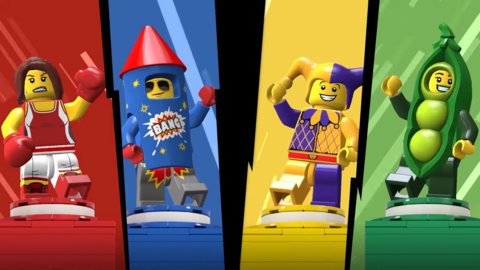GameSpot may receive revenue from affiliate and advertising partnerships for sharing this content and from purchases through links.
Mario Party is a game lots of players love, but often not without reservations. The big knock against the series has long been its late-game antics, which can render strategy meaningless by creating huge swings that can suddenly shuffle the standings, regardless of how well or poorly you’ve been playing all along. Handing out bonus stars like Oprah gifting her audience with cars just doesn’t make for a good virtual board game.
It’s also not so predictable which of the many categories of minigames will be involved in any Mario Party endgame moment, and as a result, not always so much fun to play, even while the rest of a session might be enjoyable. Lego Party, a similar minigame-laden multiplayer party game, is intended to be similar to Mario Party but without that annoyance for players, allowing them to strategize more reliably.
The team behind Lego Party removed the concept of bonus stars (gold bricks in this case) from their take on the party minigame genre, because the team understood that having late-game bonuses that can invalidate playing well in the early game is not an enjoyable mechanic. “I just don’t like them,” SMG Studio project director Mark Fennell told me bluntly. It feels like randomness added where it doesn’t belong. And I can say its absence was appreciated in my Lego Party demo at Summer Game Fest 2025.
That’s not the only pain point Lego Party seeks to address as a party “board” game. Like in Mario Party, you can steal items, including highly valuable gold bricks, from other players, if the right conditions are met. In Mario Party, you can decline to buy a star when offered, but you can’t decline to steal from another player (either a star or coins) if you land on the board game space that says you have to do so. In Lego Party, that’s not the case. Since the Lego Party team expects the game to have an audience of players with mixed experience levels, or parents playing with their kids, the change leaves room for the game’s older or more mature players to show mercy to younger ones.
“We did over 100 playtests, and we had some tears,” a developer told me, speaking to the times when kids would cry because they’d suffered a loss in the game. Lego Party was re-tuned with this feedback in mind. The option to steal gold bricks can now be declined by the pilfering player. If you’re a parent trying to go easy on your kid, you’ll have the opportunity not to go through with the action that’s going to upset them. It’s a nice touch that makes the game kid-friendlier. And of course, if you don’t want to go easy on another player, you can just choose not to.
Yet another small tweak to the rules results in big changes to how games unfold. The player turn order isn’t static, like it is in Mario Party, where it’s chosen at the beginning of the game. Instead, each turn is given a new order based on the most recent minigame results. If you were just a space away from scoring a star in Mario Party and you’re first in the turn order, you can rest assured you’ll get it after the next minigame, no matter what happens. In Lego Party, however, you’re gonna need to lock in, because the winner of the minigame gains turn priority. That means they could beat you to the gold brick when your group returns to moving around the board.
Lego Party will launch with four boards and over 60 minigames, and those I saw were a fun mix of play styles and objectives. My favorite was one in which players would need to grapple up to a moving platform–a small dancefloor, really–and amass points for staying on it and grooving away. I also saw games like a rally race, a memory test, and a familiar one where players compete for painted space on the ground, constantly painting over each other’s brushstrokes.
Lego Party benefits from being recognizable; it’s “Mario Party but Lego,” for the most part, and though that’s a fun proposition, its merits may come down more to how it differs, and in particular, how it improves on Nintendo’s long-standing party game.
Mark Delaney on Google+
Got a news tip or want to contact us directly? Email news@gamespot.com
